wheel Citroen JUMPY 2010 2.G Owner's Manual
[x] Cancel search | Manufacturer: CITROEN, Model Year: 2010, Model line: JUMPY, Model: Citroen JUMPY 2010 2.GPages: 225, PDF Size: 10.84 MB
Page 2 of 225
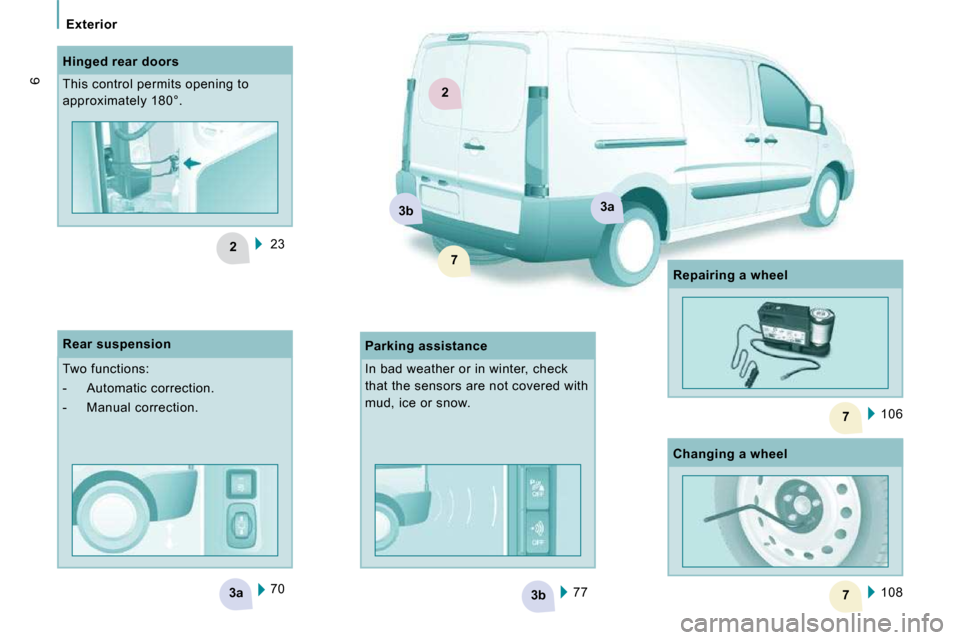
3b3a
2
7
7
2
3a3b
7
Exterior
6
77
70
Hinged rear doors
This control permits opening to
approximately 180°.
Parking assistance
Rear suspension
Two functions:
- Automatic correction.
- Manual correction.
106
Repairing a wheel
23
In bad weather or in winter, check
that the sensors are not covered with
mud, ice or snow.
108
Changing a wheel
Page 4 of 225
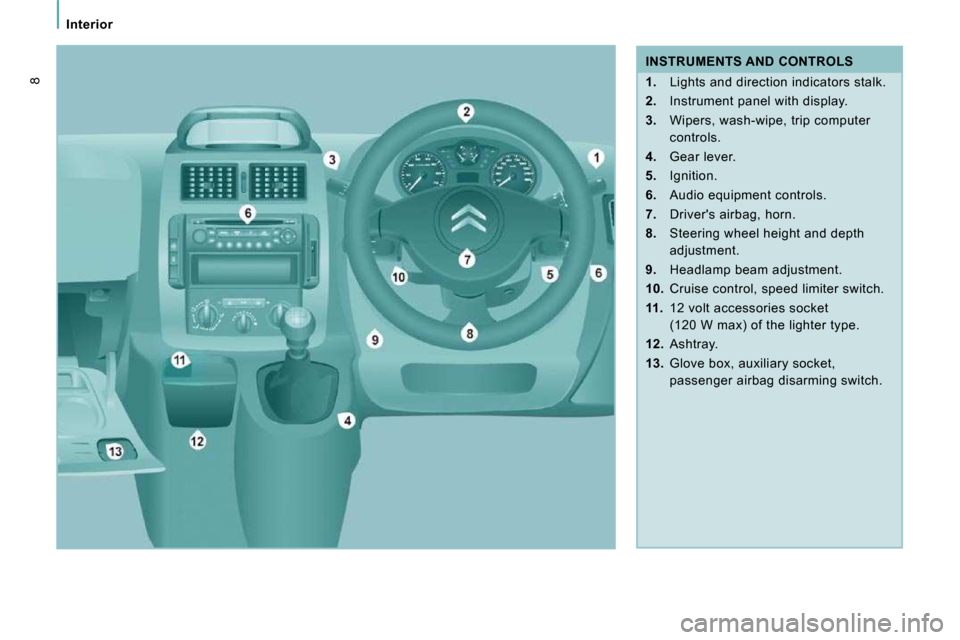
Interior
8
INSTRUMENTS AND CONTROLS
1. Lights and direction indicators stalk.
2. Instrument panel with display.
3. Wipers, wash-wipe, trip computer
controls.
4. Gear lever.
5. Ignition.
6. Audio equipment controls.
7. Driver's airbag, horn.
8. Steering wheel height and depth
adjustment.
9. Headlamp beam adjustment.
10. Cruise control, speed limiter switch.
11. 12 volt accessories socket
(120 W max) of the lighter type.
12. Ashtray.
13. Glove box, auxiliary socket,
passenger airbag disarming switch.
Page 7 of 225
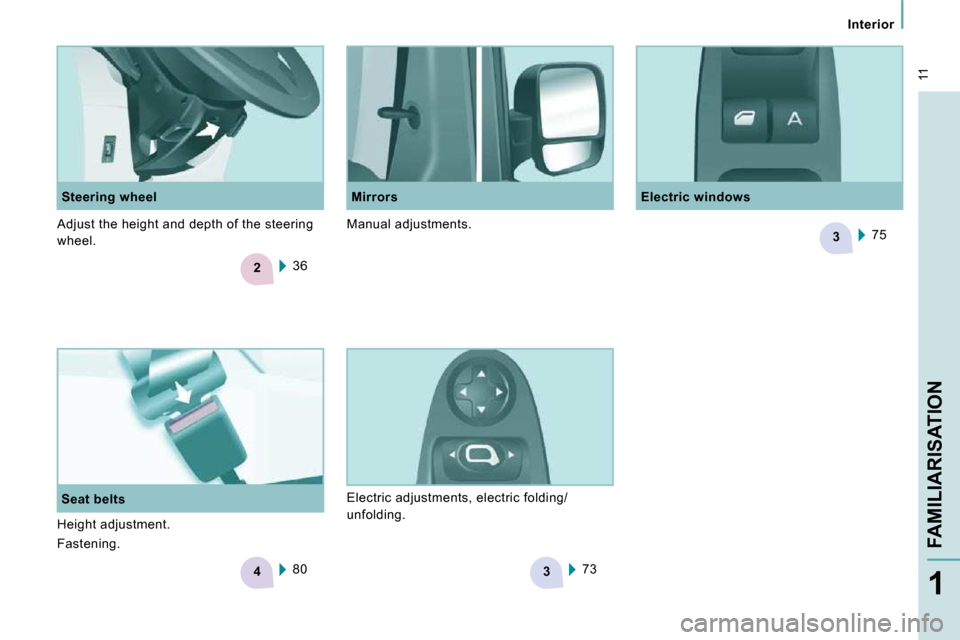
2
4
3
3
11
Interior
FAMILIARISATION
1
Seat belts Steering wheel
Electric windows
Mirrors
36
80 75
73
Electric adjustments, electric folding/
unfolding.
Height adjustment.
Fastening.
Adjust the height and depth of the steering
wheel.
Manual adjustments.
Page 30 of 225
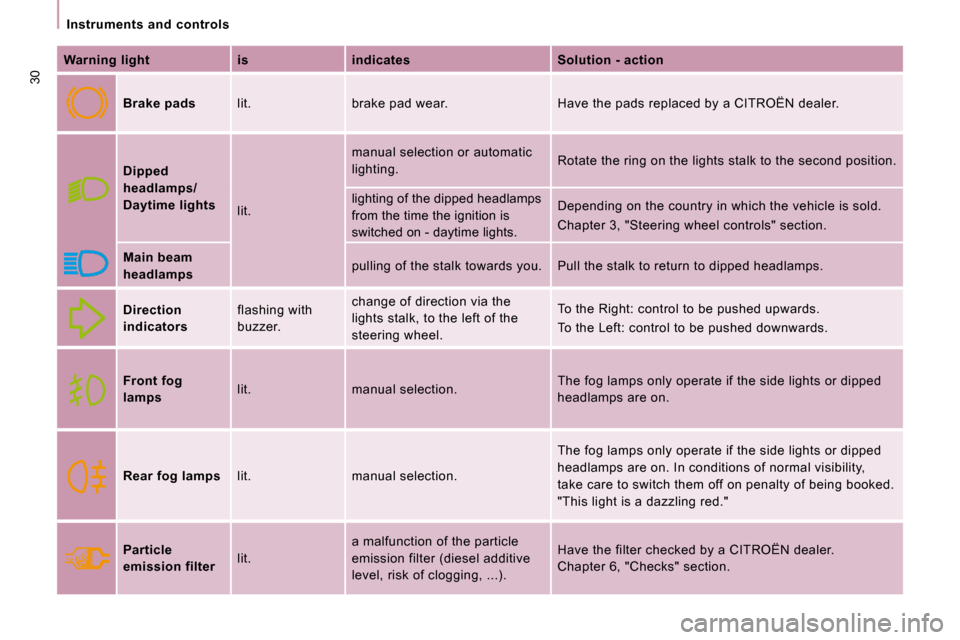
30
Instruments and controls
Warning light is indicates Solution - action
Brake pads lit. brake pad wear. Have the pads replaced by a CITROËN dealer.
Dipped
headlamps/
Daytime lights
lit. manual selection or automatic
lighting.
Rotate the ring on the lights stalk to the second
position.
lighting of the dipped headlamps
from the time the ignition is
switched on - daytime lights. Depending on the country in which the vehicle is s
old.
Chapter 3, "Steering wheel controls" section.
Main beam
headlamps pulling of the stalk towards you. Pull the stalk
to return to dipped headlamps.
Direction
indicators flashing with
buzzer. change of direction via the
lights stalk, to the left of the
steering wheel. To the Right: control to be pushed upwards.
To the Left: control to be pushed downwards.
Front fog
lamps lit. manual selection. The fog lamps only operate if the side lights or d
ipped
headlamps are on.
Rear fog lamps lit. manual selection. The fog lamps only operate if the side lights or d
ipped
headlamps are on. In conditions of normal visibilit y,
take care to switch them off on penalty of being bo oked.
"This light is a dazzling red."
Particle
emission filter lit. a malfunction of the particle
emission filter (diesel additive
level, risk of clogging, ...). Have the filter checked by a CITROËN dealer.
Chapter 6, "Checks" section.
Page 31 of 225
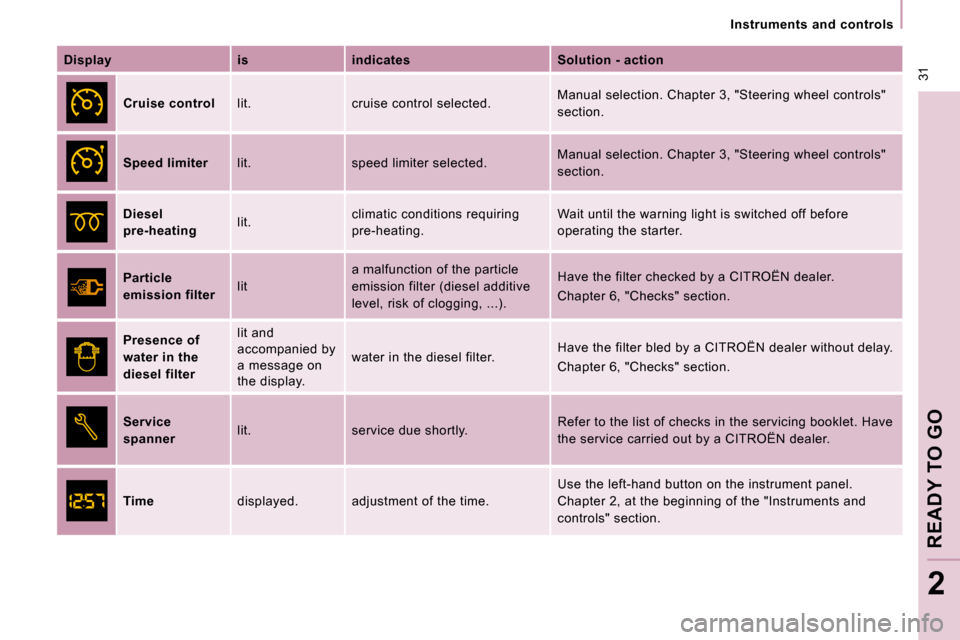
31
Instruments and controls
READY TO GO
2
Display is indicates Solution - action
Cruise control lit. cruise control selected. Manual selection. Chapter 3, "Steering wheel contr
ols"
section.
Speed limiter lit. speed limiter selected. Manual selection. Chapter 3, "Steering wheel contr
ols"
section.
Diesel
pre-heating lit. climatic conditions requiring
pre-heating. Wait until the warning light is switched off befor
e
operating the starter.
Particle
emission filter lit a malfunction of the particle
emission filter (diesel additive
level, risk of clogging, ...). Have the filter checked by a CITROËN dealer.
Chapter 6, "Checks" section.
Presence of
water in the
diesel filter lit and
accompanied by
a message on
the display.
water in the diesel filter.
Have the filter bled by a CITROËN dealer without d
elay.
Chapter 6, "Checks" section.
Service
spanner lit. service due shortly. Refer to the list of checks in the servicing bookl
et. Have
the service carried out by a CITROËN dealer.
Time displayed. adjustment of the time. Use the left-hand button on the instrument panel.
Chapter 2, at the beginning of the "Instruments and
controls" section.
Page 37 of 225
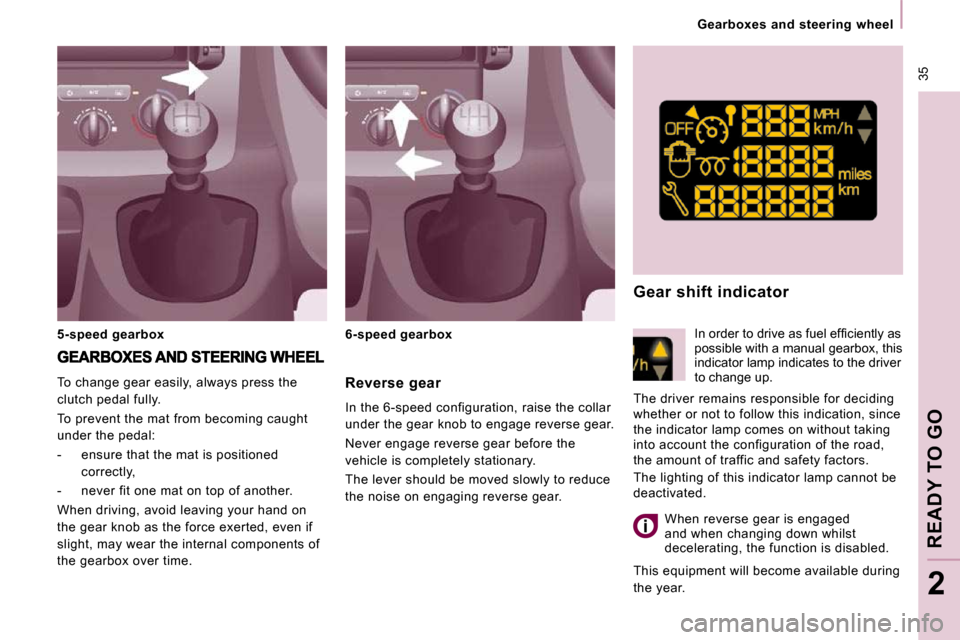
35
Gearboxes and steering wheel
READY TO GO
2
Reverse gear
In the 6-speed configuration, raise the collar
under the gear knob to engage reverse gear.
Never engage reverse gear before the
vehicle is completely stationary.
The lever should be moved slowly to reduce
the noise on engaging reverse gear.
To change gear easily, always press the
clutch pedal fully.
To prevent the mat from becoming caught
under the pedal:
- ensure that the mat is positioned
correctly,
- never fit one mat on top of another.
When driving, avoid leaving your hand on
the gear knob as the force exerted, even if
slight, may wear the internal components of
the gearbox over time.
5-speed gearbox 6-speed gearbox
This equipment will become available during
the year.
Gear shift indicator
� � �I�n� �o�r�d�e�r� �t�o� �d�r�i�v�e� �a�s� �f�u�e�l� �e�f�fi� �c�i�e�n�t�l�y� �a�s�
possible with a manual gearbox, this
indicator lamp indicates to the driver
to change up.
The driver remains responsible for deciding
whether or not to follow this indication, since
the indicator lamp comes on without taking
into account the configuration of the road,
the amount of traffic and safety factors.
The lighting of this indicator lamp cannot be
deactivated.
When reverse gear is engaged
and when changing down whilst
decelerating, the function is disabled.
Page 38 of 225

36
Gearboxes and steering wheel
STARTING AND STOPPING
Key
Take care to prevent the key from coming
into contact with grease, dust, rain or a
damp environment.
A heavy object attached to the key (key
ring, ...) weighing the key down in the
ignition switch may cause a malfunction.
Good practice when starting
Door or bonnet open warning light
If this comes on, a door or the
bonnet is not closed correctly, check!
Diesel pre-heating warning light If the temperature is high
enough, the warning light comes
on for less than one second, you
can start without waiting.
In cold weather, wait for this warning light to
switch off then operate the starter (Starting
position) until the engine starts. Good practice when stopping
Minimise engine and gearbox wear
When switching off the ignition, let the
engine run for a few seconds to allow the
turbocharger (Diesel engine) to return to idle.
Do not press the accelerator when switching
off the ignition.
There is no need to engage a gear after
parking the vehicle.
Running and accessories position.
To unlock the steering, turn the steering
wheel gently while turning the key, without
forcing. In this position, certain accessories
can be used.
Starting position.
The starter is operated, the engine turns
over, release the key.
STOP position: steering lock.
The ignition is off. Turn the steering wheel
until the steering locks. Remove the key.
STEERING WHEEL HEIGHT AND DEPTH ADJUSTMENT
When the vehicle is stationary, unlock the
steering wheel by lowering the lever.
Adjust the height and depth of the steering
wheel, then lock by pushing the lever fully
upwards. Starting and stopping
Page 73 of 225
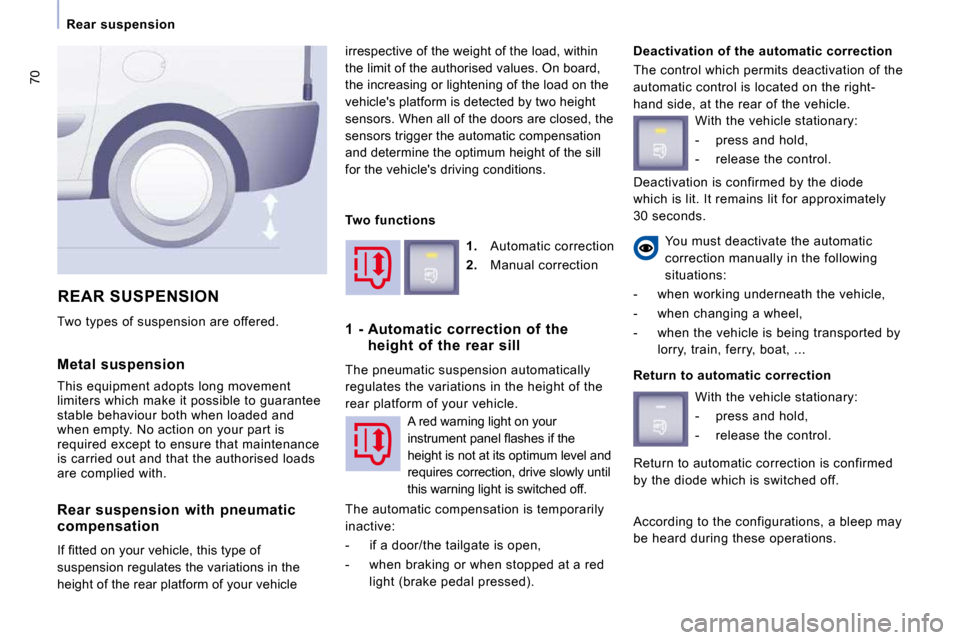
70
Rear suspension
Metal suspension
This equipment adopts long movement
limiters which make it possible to guarantee
stable behaviour both when loaded and
when empty. No action on your part is
required except to ensure that maintenance
is carried out and that the authorised loads
are complied with. irrespective of the weight of the load, within
the limit of the authorised values. On board,
the increasing or lightening of the load on the
vehicle's platform is detected by two height
sensors. When all of the doors are closed, the
sensors trigger the automatic compensation
and determine the optimum height of the sill
for the vehicle's driving conditions.
Deactivation of the automatic correction
The control which permits deactivation of the
automatic control is located on the right-
hand side, at the rear of the vehicle.
REAR SUSPENSION
You must deactivate the automatic
correction manually in the following
situations:
- when working underneath the vehicle,
- when changing a wheel,
- when the vehicle is being transported by lorry, train, ferry, boat, ...
Two types of suspension are offered.
Rear suspension with pneumatic
compensation
� �I�f� �fi� �t�t�e�d� �o�n� �y�o�u�r� �v�e�h�i�c�l�e�,� �t�h�i�s� �t�y�p�e� �o�f�
suspension regulates the variations in the
height of the rear platform of your vehicle
1. Automatic correction
2. Manual correction
1 - Automatic correction of the height of the rear sill
The pneumatic suspension automatically
regulates the variations in the height of the
rear platform of your vehicle. A red warning light on your
�i�n�s�t�r�u�m�e�n�t� �p�a�n�e�l� �fl� �a�s�h�e�s� �i�f� �t�h�e�
height is not at its optimum level and
requires correction, drive slowly until
this warning light is switched off.
The automatic compensation is temporarily
inactive:
- if a door/the tailgate is open,
- when braking or when stopped at a red light (brake pedal pressed). With the vehicle stationary:
- press and hold,
- release the control.
Return to automatic correction With the vehicle stationary:
- press and hold,
- release the control.
According to the configurations, a bleep may
be heard during these operations.
Two functions
Return to automatic correction is confirmed
by the diode which is switched off.
Deactivation is confirmed by the diode
which is lit. It remains lit for approximately
30 seconds.
Page 75 of 225

72
Rear suspension
Deactivation of the manual correction Good practice
When stationary and with the ignition key
removed, excessive use of the system
consumes battery charge. Parking for a long duration
Avoid parking for a long duration on ground
which could present a potential obstacle as
your vehicle could lower.
Following a long period out of use, the
height of the platform may change due to the
automatic compensation on unlocking or on
opening one of your vehicle's doors.
With the vehicle stationary:
- press and hold,
- release the control.
Return to manual correction
According to the configurations, a bleep may
be heard during these operations. You must deactivate the manual
correction in the following situations:
- when working underneath the vehicle,
- when changing a wheel,
- when the vehicle is being transported by lorry, train, ferry, boat, ... Warning light
Driving with the height of the rear platform:
- too low, risks damaging the technical
components underneath the vehicle,
- too high, risks unstable driving.
With the vehicle stationary:
- press and hold,
- release the control. Refer to the "Instruments and controls"
section of chapter 2.
If you start and the warning light flashes, to
switch it off:
- correct the position of the manual
control which is still at the lower or
upper limit,
- or drive slowly at above 6 mph (10 km/h), until the compensation
returns to automatic mode.
Return to manual correction is confirmed by
the diode which is switched off.
Deactivation is confirmed by the diode
which is lit. It remains lit for approximately
30 seconds.
Page 79 of 225
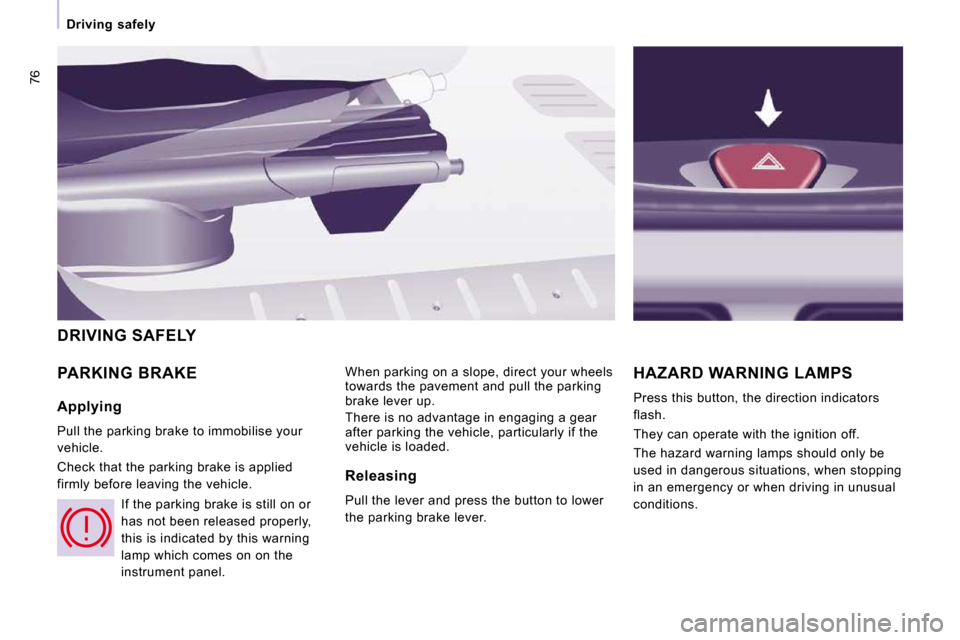
76
Driving safely
PARKING BRAKE When parking on a slope, direct your wheels
towards the pavement and pull the parking
brake lever up.
There is no advantage in engaging a gear
after parking the vehicle, particularly if the
vehicle is loaded. HAZARD WARNING LAMPS
Press this button, the direction indicators
flash.
They can operate with the ignition off.
The hazard warning lamps should only be
used in dangerous situations, when stopping
in an emergency or when driving in unusual
conditions.
DRIVING SAFELY
Applying
Pull the parking brake to immobilise your
vehicle.
Check that the parking brake is applied
firmly before leaving the vehicle. If the parking brake is still on or
has not been released properly,
this is indicated by this warning
lamp which comes on on the
instrument panel. Releasing
Pull the lever and press the button to lower
the parking brake lever.